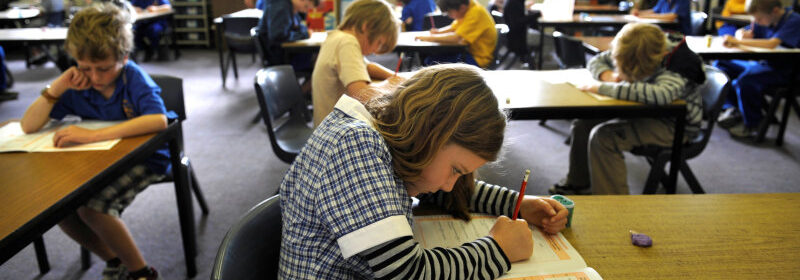Victorian results slip as other states hold steady in literacy test

Save articles for later
Add articles to your saved list and come back to them any time.
A major global test of year 4 students’ reading abilities has found a decline in performance among Victorian schoolchildren, even as results in other states held steady.
Victoria was the only Australian state or territory to register a statistically significant decline in the Progress in International Reading Literacy Study (PIRLS), a test that is held every five years and involves more than 50 countries.
Victorian year 4 students’ results in a major global literacy test have declined. Credit: Michael Clayton-Jones
The decline was attributed to a drop in the proportion of year 4 students whose results indicated advanced reading abilities for their age, rather than a decline among children in the middle or lower bands of proficiency.
The Australian Council for Educational Research (ACER), which ran the assessment locally, also noted that Victorian students had recently emerged from another period of remote learning when they sat the test in 2021.
Most countries that participated in PIRLS recorded a decline in literacy between 2016 and 2021, with the study also noting that many experienced weeks of pandemic-related disruption to face-to-face learning.
Victoria was also one of a handful of participating jurisdictions where 100 per cent of schools missed more than eight weeks of normal instruction.
Australia was one of just eight nations whose overall results did not decline.
Results of the 2021 test were published worldwide on Tuesday afternoon. PIRLS is the only major periodic global assessment of student progress that was not postponed during the pandemic.
PIRLS 2021 assessed the literacy of more than 400,000 students from 57 countries, including a nationally representative sample of 5487 Australian year 4 students.
It is the third time Australia has participated in PIRLS.
Victorian students achieved the highest mean scores in the country in 2011 and 2016 but slipped below the ACT in the latest results. It remained ahead of all other states.
Nationally, Australia maintained its position as one of the highest-scoring countries to participate, with just six countries achieving a higher mean score and eight scoring similarly.
ACER senior research fellow Kylie Hillman said Victoria’s lower mean score reflected a drop in the number of high-flying performers in the test, rather than a decrease in literacy.
“If you look at the proportion of kids who meet the Australian proficient standard, there’s been no change there,” Hillman said. “Where we are seeing the change for Victoria is in the proportion who are at the most advanced level.”
The results indicated that Victoria’s focus on giving special assistance to students who were at risk of falling behind after remote learning had paid off, she said.
Grattan Institute education program director Jordana Hunter said while Victoria has performed strongly against other state and territories, there was room for improvement. The state needs to “get serious about teaching reading”, including making sure that all teachers are being trained in best practice, she said.
“The evidence is clear that primary school teachers should be trained in structured systematic phonics and should have the skills and resources to support children to access a wide vocabulary and background knowledge, which is essential for reading comprehension,” Hunter said.
Glenn Fahey, education program director for the Centre for Independent Studies, said the results could indicate that during lockdowns, advanced younger readers might have missed out on being directed by their teachers towards more challenging texts.
“You might presume that children who were doing well were not given the additional challenges they might have otherwise been given,” Fahey said.
Victorian Education Minister Natalie Hutchins said she was proud to see Victorian students achieve strong results in PIRLS again, well ahead of other states and territories other than the ACT.
“We want every child in every school to have the opportunity to fulfil their potential, that’s why we’ve delivered record funding in education which has ensured Victorian students remain top of class when compared to their counterparts across the nation,” Hutchins said.
Opposition education spokesman Matthew Bach said the significant decline in results was not surprising, given “our teachers are drowning in unnecessary administrative tasks, and schools are underfunded”.
Australia was one of 38 countries where girls significantly outperformed boys, with 84 per cent of girls meeting the national benchmark for literacy, compared with 77 per cent of boys. But Victoria bucked the trend, the only state or territory along with the ACT without a statistically significant gender gap in performance.
Federal Minister for Education Jason Clare said it was good news that Australia didn’t go backwards during COVID-19, when the report showed 21 other countries did.
“A lot of that is down to the work that teachers, parents and students all put in during the pandemic,” Clare said.
“However, the report also confirms what I have been saying about the gap in reading skills between children from wealthy and poor families. This is serious and shows why real reform is needed.”
The next school funding agreement between the Commonwealth, states and territories will tie funding to things that will help children who are falling behind get the support they need to catch up, he said.
The Morning Edition newsletter is our guide to the day’s most important and interesting stories, analysis and insights. Sign up here.
Most Viewed in National
From our partners
Source: Read Full Article

